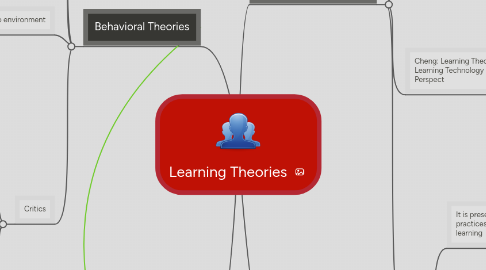
1. Behavioral Theories
1.1. Actually is Behavioural Psychology
1.2. The study of learning must restrict itself to observable behaviours and the stimulus conditions that control the behaviours
1.3. Applications like Social Learning Theory and Theory of Planned Behaviour
1.3.1. Improve health education
1.4. Learning due to environment
1.4.1. Four Basic Rules Linking Behaviour to Environmental Effects or Conditioning (Ref: http://goo.gl/6Oe4fy)
1.4.1.1. Add to a situation after a response
1.4.1.1.1. Pleasant = Positive Reinforcement- Reward. Increases the probability of the same response occurring again.
1.4.1.1.2. Noxious = Punishment- Administering a painful or unpleasant reinforcer after an unwanted response. Decreases the probability of the same response occurring again
1.4.1.2. Remove from a situation after a response
1.4.1.2.1. Pleasant = Punishment - Decrease the probability of the same response occurring again
1.4.1.2.2. Noxious = Negative Reinforcement - Removing or decreasing an unpleasant or painful situation after a desirable response is produced. Increases the probability of the same response occurring again
1.5. Critics
1.5.1. Overlook important aspects of learning (motivation, memory, thinking)
1.5.2. Emphasise the instructor, not the learner
1.5.3. Ignores valuable inadvertent outcomes
1.5.4. ...
2. Cognitive Theories
2.1. Brings in unobservable constructs
2.1.1. Able to undertake serious study of mental functioning
2.1.1.1. Development of new experimenting tools
2.1.1.2. New qualitative research methodologies
2.2. J. Piaget
2.2.1. Human learning styles are differnet in different ages
2.2.1.1. Teachers should use different methods which are suitable. E.g. We cannot use abstract concept to explain to a 2 years old kid as they are only in preoperational stage
3. Ideas and Reflections
3.1. Holding a high and feasible expetation on students
3.1.1. In my teaching experience, I intended to hold a HIGH expectation on my students, as I generally, even blandly believe that will accelerate their learning. However, it made me less patient, and often frustrated since the students frequently fail my expectations.
3.1.2. As notions from Piaget and Erikson were introduced to me, I understand that I need to better manage my expectations, and make them more feasible, and age-appropriated, to meet the development stage circle of my students, rather than spoil things by excessive enthusiasm, and avoid counterproductive actions.
3.2. Jacky Wu: I think that every theory has its advantages. For me, constructivist theories impress me a lot. Since teacher cannot teach much to student in school time, if student learns how to construct knowledge by themselves, they can learn much in leisure time.
3.3. Cheng: Learning Theories in Design of Online Learning Technology from A Developer's Perspect
3.3.1. The design is influenced by a variety of approaches based on the designer's individual values and belief s about education
3.3.1.1. Also limited by the requirements from the client (Customized Orders )
3.3.2. How to best serve the learner
3.3.2.1. Apply latest technology
3.3.2.1.1. AJAX, Video Conferencing, Collaborative Applications, Mobile Apps ...
3.3.2.2. Great User Experience
3.3.2.2.1. UI / UE Design
3.3.2.3. Digitized Learning Materials
3.3.2.3.1. Responsive Learning Materials
3.3.2.4. ...
3.3.3. Theories in Online Learning
3.3.3.1. Behavioural Theories
3.3.3.1.1. User Behaviours DATA
3.3.3.2. Constructivist Theories
3.3.3.2.1. Participation Forum by Dr. Brant
3.3.3.2.2. Conferencing Based Learning System
3.3.3.2.3. Virtual Reality
3.3.3.2.4. ...
3.4. Idea 4
4. Constructivist Theories
4.1. It is presently dominating practices and research in learning
4.1.1. Learning is an active process of construction opposed to acquiring knowledge
4.1.2. Information is not received from the outside BUT CONSTRUCTED based on the personal experiences and cognitive structures available to an individual
4.1.3. Learning takes place in the mind of the individual through DISCOVERY
4.2. An instruction approach
4.2.1. High-order Thinking
4.2.2. Learning Outcomes
4.2.3. Social Interaction
4.3. Student learns by themselves
4.3.1. share and learn togehter with new knowledge
4.4. Often Problem Centered
4.4.1. Discovery Learning
4.4.2. Role-Play
4.4.3. Construction of Projects
4.4.4. ...
